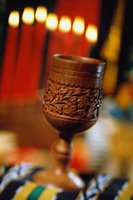 Reflecting upon African ancestry, unity and values
Reflecting upon African ancestry, unity and valuesKwanzaa is the Swahili word for "first fruits." And just like a joyous harvest, it's a time for celebration. Guided by the seven traditional principles known as Nguzo Saba, Kwanzaa starts on Dec. 26 and is a week of reflection on African ancestry, unity and values. The holiday is observed annually by more than 18 million people throughout the United States, Canada, England and the Caribbean.
Maulana Ron Karenga, now a professor of black studies at California State University, Long Beach, came up with the idea for Kwanzaa in 1966 as a way to restore a sense of connection with African culture.
When someone greets you by saying, "Habari gani?" they're asking you what's new. And during Kwanzaa, the answer is always the honored principle of the day.
Umoja
The first principle of Kwanzaa, Umoja, stands for unity. On Dec. 26, the day is set aside to resolve family or community problems and find ways for everyone to pull together.
Kujichagulia
Kujichagulia is the second principle, and its translation is "self-determination." Dec. 27 is dedicated to the need for living and speaking for oneself and to be true to what one knows is right. To live the value of Kujichagulia, families can explore their African heritage through culture, language and history. It's a time to learn more about the historical events that helped define culture (e.g. the civil rights movement in the United States).
Ujima
The third day of Kwanzaa is based on Ujima, collective work and responsibility. On this day, people of color can help each other accomplish chores, and join with the community to complete area projects.
Ujamaa
The principle of Ujamaa, or cooperative economics, helps build strong financial foundations. Shopping in black-owned stores or sharing skills are great ways to celebrate Ujamaa.
Nia
As people of color affirm Nia, they reinvigorate their sense of purpose. They respect their individual goals, as well as those of others. Values and the traditions of the past are honored.
Kuumba
Dec. 31 is dedicated to Kuumba, or creativity, and African arts take center stage. The festivities include reading poetry, telling folk tales, and performing traditional dances.
Imani
On Jan. 1, the principle of faith is honored.
As the holiday of Kwanzaa closes and the new year begins, people of African ancestry come together in pride and self-worth. A feast, called Karamu, is served and homemade gifts, Zawadi, are shared.
Kwanzaa is a holiday celebrating the legacies of the past and the remembrance of the struggles. And always, it is about pride, courage and hope for the future.
Related: The Official Kwanzaa Website
Tags: Kwanzaa, Holidays, African-American, Pan-African, History, Education by Sistrunk
5 comments:
Interesting. There is much to learn here.
Kwanzaa is not a holiday. It is a cultural celebration.
Cecilia and Anonymous: Thanks so much for stopping by.
Cecilia, you have a wonderful site!
Anonymous, feel free to leave your first name or a nickname the next time you visit.
BTW, Anonymous, according to the founder Kwanzaa, Dr. Maulana Karenga, Kwanzaa is a celebration and a holiday. However, I am the last person to split hairs. Clearly, we both agree that Kwanzaa is a celebration.
Call me a geek if you wish, but I love it when someone sends me to the dictionary. :-)
Definititons of the word "holiday" include the term "celebration." Check out the American
Heritage Dictionary and/or the Cambridge Dictionary of American English.
Best wishes to you both for the new year.
Len: You and I are a lot alike when it comes to holidays. :-) Easter is the primary holiday for me for the same reasons that you give. I also agree with your take on Kwanzaa principles.
I posted the information on Kwanzaa for educational purposes because I know that many people celebrate it. Perhaps more importantly, I know many people curious about Kwanzaa, but they are not sure exactly what it is or why it is celebrated.
My feelings about celebrating Easter are also similar to yours. I make it a part of my lifestyle, not just a once-a-year observance.
I always enjoy hearing from you. You always bring additional insight, and that is very much appreciated.
Jaimie: Thank you for telling me about James' post. I will check it out. I hope that you're enjoying your time with your family.
Post a Comment